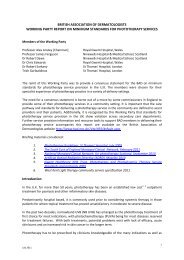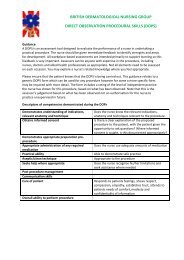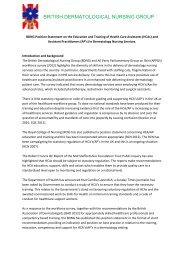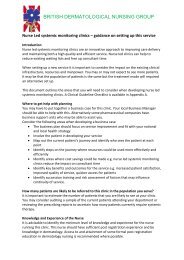Improving outcomes for people with skin tumours including melanoma
Improving outcomes for people with skin tumours including melanoma
Improving outcomes for people with skin tumours including melanoma
Create successful ePaper yourself
Turn your PDF publications into a flip-book with our unique Google optimized e-Paper software.
<strong>Improving</strong> Outcomes <strong>for</strong><br />
People <strong>with</strong> Skin Tumours<br />
<strong>including</strong> Melanoma<br />
Organisation of <strong>skin</strong><br />
cancer services<br />
Coordination across teams<br />
It is important that the transfer of care of patients between teams is as<br />
flexible, comprehensive and timely as possible to avoid undue delays<br />
and ensure continuity of care. Close coordination is required between<br />
clinicians working in the community, LSMDTs, SSMDTs, palliative care<br />
teams and patients, carers and their families. There should be a<br />
designated individual in each team who has responsibility <strong>for</strong><br />
communication and in<strong>for</strong>mation provision, and adequate support must<br />
also be provided to ensure that all discussions about patient<br />
management are recorded.<br />
3<br />
Clearly defined arrangements should be made to ensure that<br />
appropriate in<strong>for</strong>mation (<strong>including</strong> the name of the doctor and CNS<br />
who are directly responsible <strong>for</strong> each patient) is communicated<br />
properly to each patient and others (such as GPs) who may require,<br />
or may benefit from, in<strong>for</strong>mation about decisions concerning particular<br />
patients. GPs should be given sufficient in<strong>for</strong>mation about each<br />
patient’s cancer and his or her management to enable them to advise<br />
and support patients and their carers.<br />
There should be clear and documented arrangements <strong>for</strong> cross-cover<br />
in all teams and all members should meet the MDT attendance<br />
criterion. This commitment should be <strong>for</strong>mally acknowledged in the<br />
consultant contract as programmed activity (PA).<br />
It is recognised that a period of transition will be required be<strong>for</strong>e the<br />
new pattern of service provision is established.<br />
Patient in<strong>for</strong>mation<br />
Trusts should provide in<strong>for</strong>mation to patients, as outlined in the<br />
chapter on ‘Patient-centred care’. If patient support groups or user<br />
involvement groups exist, then in<strong>for</strong>mation on these should also be<br />
provided <strong>for</strong> patients. In<strong>for</strong>mation should contain details of the<br />
patient’s specific condition and treatment, relevant MDTs, contact<br />
names and phone numbers, clinical appointments and a diary in<br />
which patients can record symptoms and other potentially useful<br />
in<strong>for</strong>mation about their condition if appropriate. This will be of value<br />
both <strong>for</strong> the patient’s own use and to other healthcare professionals<br />
required to care <strong>for</strong> the patient out of normal working hours.<br />
50<br />
National Institute <strong>for</strong> Health and Clinical Excellence















